 Solar System |
OF THE
FOUR QUARTERS OF THE WORLD,
AND FIRST OF EUROPE.
A
Swedish Man and Woman in their proper
Dresses.
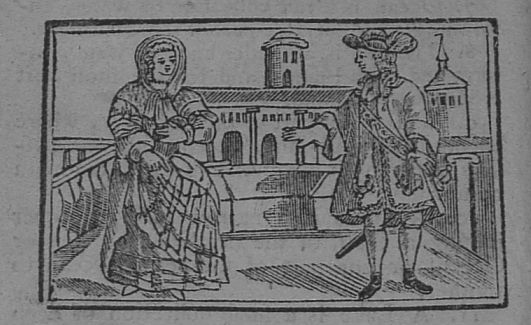
An Historical and Geographical Account of
SWEDEN, DENMARK, and NORWAY.
Dresses.

An Historical and Geographical Account of
SWEDEN, DENMARK, and NORWAY.
SWEDEN is one of the Northern Kingdoms,
great and populous; is bounded on the North by Lapland, Norway, and the
Frozen Sea; on the East by Muscovy; on the South by the Baltic Sea; on the West by Denmark and Norway. It is divided into six parts, contains seventeen cities, the capital is Stockholm; the air is cold, but wholesome; it abounds with all the necessaries of life; the inhabitants are long-lived; they trade in brass, lead, iron, steel, copper, skins, furs, deals [fir or pine wood, as a building material], oak, pitch, and tar: They are civil, and so industrious that a beggar is not to be seen among them; good soldiers, strong and healthy. It was formerly elective, but now hereditary. -- It is governed by a King and the States, which consist of the nobility, clergy, and the merchants; their religion is Lutheranism, and dialect Teutonic and German.
DENMARK lies to the North of England, is but a small kingdom, Copenhagen is the metropolis. The King of Denmark is also Sovereign of Norway, Greenland, Fero [also written Faro], &c. The air is very cold, the country fruitful; there is store of deer, elks, horses, cattle, &c. also fish, especially herrings; their commodities are chiefly tallow, timber, hides, and rigging for ships: The crown is hereditary, the government entirely in the power of the King, and their religion the same as in Sweden.
NORWAY is a kingdom on the North-West shore of Europe, belongs to the King of Denmark, is separated from Sweden by a ridge of mountains always covered with snow; the chief town is Drontheim [corruption of Trondheim]. It is mountainous, barren, and extremely cold, therefore but thinly peopled; they are a plain people, of the same religion as those of Denmark. The produce of the country is good for timber, oak, pitch, tar, copper, and iron; and their seas abound with fish, which the inhabitants dry upon the rocks without salt, and sell them to most nations in Europe, to victual their ships in long voyages. They have very little corn grown in the country; and the inhabitants feed on the flesh of bears, wolves, and foxes; and the poorer sort make bread of dried fish ground to powder, while the better sort exchange the commodities above-mentioned for corn, fruits, wine, and other necessaries. Their longest day in the northern parts is two months, and shortest in the southern about eight hours.
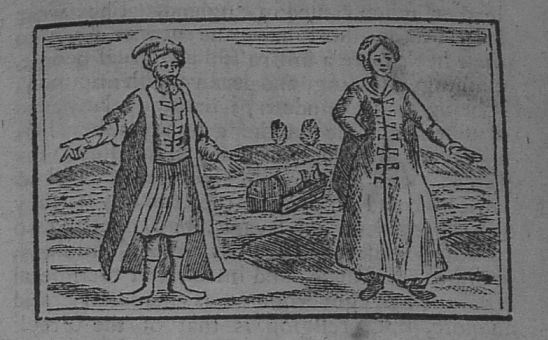
An account of MOSCOVY, or RUSSIA.
(97)
Frozen Sea; on the East by Muscovy; on the South by the Baltic Sea; on the West by Denmark and Norway. It is divided into six parts, contains seventeen cities, the capital is Stockholm; the air is cold, but wholesome; it abounds with all the necessaries of life; the inhabitants are long-lived; they trade in brass, lead, iron, steel, copper, skins, furs, deals [fir or pine wood, as a building material], oak, pitch, and tar: They are civil, and so industrious that a beggar is not to be seen among them; good soldiers, strong and healthy. It was formerly elective, but now hereditary. -- It is governed by a King and the States, which consist of the nobility, clergy, and the merchants; their religion is Lutheranism, and dialect Teutonic and German.
An
Account of DENMARK.
DENMARK lies to the North of England, is but a small kingdom, Copenhagen is the metropolis. The King of Denmark is also Sovereign of Norway, Greenland, Fero [also written Faro], &c. The air is very cold, the country fruitful; there is store of deer, elks, horses, cattle, &c. also fish, especially herrings; their commodities are chiefly tallow, timber, hides, and rigging for ships: The crown is hereditary, the government entirely in the power of the King, and their religion the same as in Sweden.
(98)
An
Account of NORWAY.
NORWAY is a kingdom on the North-West shore of Europe, belongs to the King of Denmark, is separated from Sweden by a ridge of mountains always covered with snow; the chief town is Drontheim [corruption of Trondheim]. It is mountainous, barren, and extremely cold, therefore but thinly peopled; they are a plain people, of the same religion as those of Denmark. The produce of the country is good for timber, oak, pitch, tar, copper, and iron; and their seas abound with fish, which the inhabitants dry upon the rocks without salt, and sell them to most nations in Europe, to victual their ships in long voyages. They have very little corn grown in the country; and the inhabitants feed on the flesh of bears, wolves, and foxes; and the poorer sort make bread of dried fish ground to powder, while the better sort exchange the commodities above-mentioned for corn, fruits, wine, and other necessaries. Their longest day in the northern parts is two months, and shortest in the southern about eight hours.
(99)
A Moscovite, or Russian Man and Woman in
their proper Dresses.
A Moscovite, or Russian Man and Woman in
their proper Dresses.

An account of MOSCOVY, or RUSSIA.
MOSCOVY is the largest country in
Europe, and which comprehends all that vast country which obeys the
Czar, or Czarina. It is bounded by the Northern Ocean on the
North; the rivers Oby and Tanais on the East; the Little Tanais, the
rivers Desna and Sosa, with Lesser Tartary, on the South; Narva [on the border with Estonia; now part
of Estonia],
Poland, Sweden, and Norway on the West: It contains about forty
provinces; is a marshy country, not well inhabited, full of forests and
rivers; the winter is long, and very cold; They sow only rye
before winter,
and the other corn in May, though their harvest is in July and August. They have plenty of fruit, melons, fowl, and fish; and their commodities are salt, brimstone, pitch, tar, hemp, flax, iron, steel, copper, and Russian leather, much valued in England. They wear long beards, short hair, and gowns down to their heels; are a mistrustful and cruel people, cunning in trading, and deceive with impunity, it being counted industry; naturally lazy and drunken [hopefully Western attitudes to other cultures have improved in the last 200 years], and lie on the ground or benches, all excent [sic] the gentry. Until Czar Peter the Great (who polished the people, as well as enriched and improved the country), they were barbarous and savage; but he setting up printing-houses and schools in his dominions, banished ignorance, and introduced the liberal arts. Their government is hereditary and absolute, their religion is that of the Greek church. They have a number of clergy, and divers monasteries for friars and nuns. The Emperor of Moscovy is called the Czar, and Empress the Czarina.
(100)
and the other corn in May, though their harvest is in July and August. They have plenty of fruit, melons, fowl, and fish; and their commodities are salt, brimstone, pitch, tar, hemp, flax, iron, steel, copper, and Russian leather, much valued in England. They wear long beards, short hair, and gowns down to their heels; are a mistrustful and cruel people, cunning in trading, and deceive with impunity, it being counted industry; naturally lazy and drunken [hopefully Western attitudes to other cultures have improved in the last 200 years], and lie on the ground or benches, all excent [sic] the gentry. Until Czar Peter the Great (who polished the people, as well as enriched and improved the country), they were barbarous and savage; but he setting up printing-houses and schools in his dominions, banished ignorance, and introduced the liberal arts. Their government is hereditary and absolute, their religion is that of the Greek church. They have a number of clergy, and divers monasteries for friars and nuns. The Emperor of Moscovy is called the Czar, and Empress the Czarina.
(101)
A French Man and Woman in their proper Dresses.
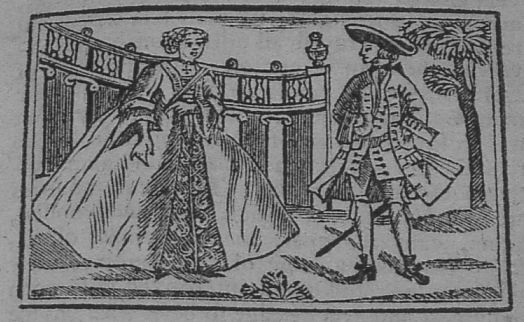
An Historical and Geographical Account of FRANCE.
GERMANY is a large, fruitful, and pleasant country, which has the title of an Empire. It is bounded on the North by the Baltic Sea, Denmark, and the German Ocean; on the East by Hungary, Prussia, and Poland; on the South by the Alps; on the West by the Netherlands, Lorrain, and French Compte [today Franche-Compté]. It is divided into higher and lower;
its whole length is about 840 Italian miles, and breadth about 740; the soil is very fertile, and furnishes every thing necessary; the chief rivers are the Danube, the Rhine, Elbe, Oder, and Weser. -- Tacitus, speaking of the Ancient Germans, says, -- "They sung [sic] when they marched to fight, and judged of the success by the shouts and huzzas at the onset. Their wives, as martial as themselves, accompanied them to the war to dress their wounds, and provide them with necessaries. They esteemed nothing so infamous as to throw away or lose their shield. They buried the bodies of their noblemen on a funeral pile, with their arms and horse." The Germans of our age are laborious [hard-working], simple [straightforward], and brave, but ready to serve for money, constant in their religion, true friends, open enemies.
The inventions of printing, gunpowder, and fire-arms are attributed to them. There are above three hundred different Sovereignties in Germany, most of which are subject to the supreme head, the Emperor, who is chosen by the nine Electors, viz. the Archbishops of Mentz, Triers, and Cologn; the King of Bohemia; the Duke of Bavaria; the Duke of Saxony; the Marquis of Brandenburgh, (King of Prussia); the Prince Palatine of the Rhine; and the Elector of Hanover, (King of England). The Electors are the principal members of the Empire, and absolute Sovereigns in their own dominions. Their religion, for the greatest part, is Popery; but in several states and cities,
particularly Prussia, the Protestant prevails. The chief city is Vienna, in the Dukedom of Austria, which is the seat of the Emperor.
A Dutch Man and Woman in their proper
Habits.
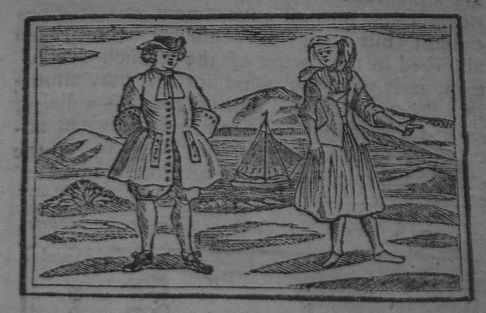
A French Man and Woman in their proper Dresses.

An Historical and Geographical Account of FRANCE.
FRANCE is one of the finest and largest
countries in Europe, lies in the middle of the Temperate Zone, is
washed by the ocean to the west, by the Mediterranean Sea to the South,
joins to the Low Countries to the North, Germany and Italy lie to the
East, and Spain to the South. Its length and breadth is about 225
leagues each. Its chief city is Paris; there are ten
universities, and many very stately palaces, the chief of which is that
at Versailles, about eleven miles from Paris, where their Kings used to
reside. It abounds with all the necessaries of life, which made
the Emperor Maximilian say, "That if it were possible he himself were
God, his eldest son should succeed him, and the second should
"be King of France." The common people were reckoned industrious, and the better sort very polite, well bred, extremely gay in dress, and civil to strangers, till their late wonderful revolution destroyed all distinctions, and involved them in a contest with the rest of Europe; which seems to have reversed their manners, and renders it impossible to say what will in future be the distinguishing traits of the national character, when they shall again cultivate the arts of peace. Their commodities are brandy, wine, salt, silks, linen and woollen, hemp, canvas, paper, soap, almonds, olives, &c. To take a view of the country, their fields are long and open, intermixed with corn and vines, and every hedge so beset with choice fruits, that eyes can hardly have fairer objects.
'Twas in this country that Master Tommy Courtly and his sister, who went over with their papa, learnt all that good manners and genteel behaviour, which made every body love and admire them so much at their return home; which had such an effect on their brother Jack, (who was a rude, ill-natured, slovenly boy), that he soon grew better; and to prevent himself being utterly despised, and turned out of doors, by his papa and mamma, for his undutiful behaviour, he immediately mended his manners, and in a very little time was beloved and admired, almost equally with his brother Tommy. It has now, however, ceased to be the school of Europe; and as the late extraordinary events, which brought their
Monarch to the block, and occasioned the people to declare for a Republican government, have been attended with a total loss of trade, and the destruction of the arts, it must be many years before travellers can again visit this country with hope of similar advantages.
(102)
"be King of France." The common people were reckoned industrious, and the better sort very polite, well bred, extremely gay in dress, and civil to strangers, till their late wonderful revolution destroyed all distinctions, and involved them in a contest with the rest of Europe; which seems to have reversed their manners, and renders it impossible to say what will in future be the distinguishing traits of the national character, when they shall again cultivate the arts of peace. Their commodities are brandy, wine, salt, silks, linen and woollen, hemp, canvas, paper, soap, almonds, olives, &c. To take a view of the country, their fields are long and open, intermixed with corn and vines, and every hedge so beset with choice fruits, that eyes can hardly have fairer objects.
'Twas in this country that Master Tommy Courtly and his sister, who went over with their papa, learnt all that good manners and genteel behaviour, which made every body love and admire them so much at their return home; which had such an effect on their brother Jack, (who was a rude, ill-natured, slovenly boy), that he soon grew better; and to prevent himself being utterly despised, and turned out of doors, by his papa and mamma, for his undutiful behaviour, he immediately mended his manners, and in a very little time was beloved and admired, almost equally with his brother Tommy. It has now, however, ceased to be the school of Europe; and as the late extraordinary events, which brought their
(103)
Monarch to the block, and occasioned the people to declare for a Republican government, have been attended with a total loss of trade, and the destruction of the arts, it must be many years before travellers can again visit this country with hope of similar advantages.
Germans
in their proper Habits.
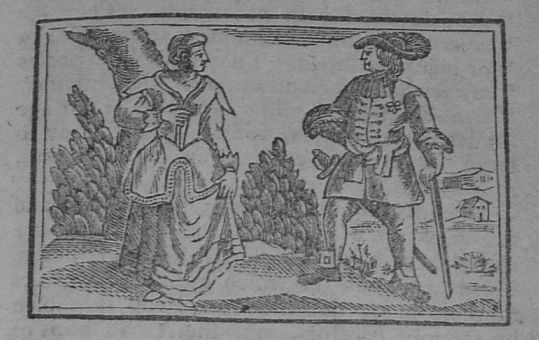
An Account of GERMANY.

An Account of GERMANY.
GERMANY is a large, fruitful, and pleasant country, which has the title of an Empire. It is bounded on the North by the Baltic Sea, Denmark, and the German Ocean; on the East by Hungary, Prussia, and Poland; on the South by the Alps; on the West by the Netherlands, Lorrain, and French Compte [today Franche-Compté]. It is divided into higher and lower;
(104)
its whole length is about 840 Italian miles, and breadth about 740; the soil is very fertile, and furnishes every thing necessary; the chief rivers are the Danube, the Rhine, Elbe, Oder, and Weser. -- Tacitus, speaking of the Ancient Germans, says, -- "They sung [sic] when they marched to fight, and judged of the success by the shouts and huzzas at the onset. Their wives, as martial as themselves, accompanied them to the war to dress their wounds, and provide them with necessaries. They esteemed nothing so infamous as to throw away or lose their shield. They buried the bodies of their noblemen on a funeral pile, with their arms and horse." The Germans of our age are laborious [hard-working], simple [straightforward], and brave, but ready to serve for money, constant in their religion, true friends, open enemies.
The inventions of printing, gunpowder, and fire-arms are attributed to them. There are above three hundred different Sovereignties in Germany, most of which are subject to the supreme head, the Emperor, who is chosen by the nine Electors, viz. the Archbishops of Mentz, Triers, and Cologn; the King of Bohemia; the Duke of Bavaria; the Duke of Saxony; the Marquis of Brandenburgh, (King of Prussia); the Prince Palatine of the Rhine; and the Elector of Hanover, (King of England). The Electors are the principal members of the Empire, and absolute Sovereigns in their own dominions. Their religion, for the greatest part, is Popery; but in several states and cities,
(105)
particularly Prussia, the Protestant prevails. The chief city is Vienna, in the Dukedom of Austria, which is the seat of the Emperor.

HOLLAND and FLANDERS, which are
called the Seven Provinces, and the Netherlands, are inhabited by the
Dutch.
This country is also in Germany, though mostly independent of the Empire; the greatest part belongs to the Dutch, part to the French, and part to the Emperor: Its capital city is Amsterdam, a place of vast trade and riches. The air is moist and foggy; the country, lying low, is naturally wet and fenny, and employed chiefly in grazing of cattle; little corn grows there, but they import abundance from other countries; the soil is fertile, the natural pro-
duce is chiefly butter and cheese, in which their trade has been great, but that of herrings the most considerable; and they had manufactures of various kinds, carrying on a prodigious trade to most parts of the world. They are a plain and frugal people, and very laborious. Their form of government was very peculiar; but their independence having been absorbed in the vortex of the French revolution, it is uncertain what form it may assume in a short period. Their language is a dialect of the German. The reformed religion, according to the doctrines of Calvin, is the established one, though all are tolerated.
This country is also in Germany, though mostly independent of the Empire; the greatest part belongs to the Dutch, part to the French, and part to the Emperor: Its capital city is Amsterdam, a place of vast trade and riches. The air is moist and foggy; the country, lying low, is naturally wet and fenny, and employed chiefly in grazing of cattle; little corn grows there, but they import abundance from other countries; the soil is fertile, the natural pro-
(106)
duce is chiefly butter and cheese, in which their trade has been great, but that of herrings the most considerable; and they had manufactures of various kinds, carrying on a prodigious trade to most parts of the world. They are a plain and frugal people, and very laborious. Their form of government was very peculiar; but their independence having been absorbed in the vortex of the French revolution, it is uncertain what form it may assume in a short period. Their language is a dialect of the German. The reformed religion, according to the doctrines of Calvin, is the established one, though all are tolerated.
A
Spanish Man and Woman in their
proper
Habits.
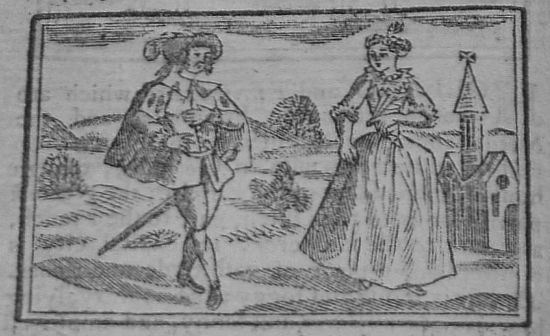
An Account of SPAIN.

An Account of SPAIN.
SPAIN is separated from France by the
Pyrenean Hills, and on all other sides is surrounded by the
Mediterranean Sea, the
Straits of Gibraltar, and the Atlantic Ocean. The King has the most lands of any Prince in the world, on which account some of their predecessors have boasted, "That the sun never sets in their dominions, as having possessions in all the four parts of the world." He is stiled [sic] his Catholic Majesty. His Court is different from all others, he gives audience but one day in a week, and the rest he is shut up in his palace, the courts of which are full of merchants' shops, and resemble the cloisters of religious houses. The air of Spain is pure and dry, but very hot; the soil is sandy, and mostly barren, though where fertile not well cultivated, through the pride and laziness of the people, to which they are much addicted; though what they want in corn is made up in a variety of excellent fruits and wines, of which they have great plenty. Their chief commodities are wine, oil, fruits of various sorts, wool, lamb-skins, honey, cork, &c. The people are grave and majestic, faithful to their Monarch, delicate in point of honour, jealous, lascivious, and tyrants over a vanquished enemy; look upon husbandry and the mechanical arts with the greatest contempt. Their government is an absolute Monarchy, and their crown hereditary as well to females as to males. Their religion is Roman Catholic, nor is any other tolerated. Madrid is their capital city, which stands near the middle of the country, on top of a hill, by the little river Manzanares.
PORTUGAL joins to Spain, and to the East is bounded by Spanish provinces; the capital city is Lisbon, a place of great trade and riches, with an excellent harbour: The soil of this country is poor, and produces but little, except wine and fruit. The nobility and gentry are magnificent and hospitable, but the common people much addicted to thieving. It is governed by its own King, who is by much the richest crowned head in Europe. His government is absolute, and crown hereditary. The established religion is Popery, though others are tolerated, but are under a necessity of being very reserved and cautious,
for fear of the inquisition, which is a court or tribunal for the examination and punishment of offenders, whom they torture in the most cruel manner [jewishvirtuallibrary.org states that the last auto-da-fe in Portugal took place on October 27, 1765. Not until 1808, during the brief reign of Joseph Bonaparte, was the Inquisition abolished in Spain].
Lisbon, the capital city, as before-mentioned, is about six miles in length, built on seven hills, surrounded with a wall, on which are 77 towers, and 36 gates; is reckoned to contain 30,000 houses, and 150,000 inhabitants, (whose foreign trade is equal to any city in Europe, except London and Amsterdam.)-- There is a cathedral, 37 parish churches, 23 cloisters, several handsome squares, and sumptuous buildings, the largest of which is the King's palace. Such was the state of this opulent city till the 1st of November, 1755, when the greatest part of it was reduced to a heap of ruins by a most tremendous earthquake, which was followed by a terrible fire. A gentleman who was present, giving an account of the calamity to his friend in England, says, "It is not to be expressed by human tongue, how dreadful and awful it was to enter the city after the disaster; in looking upwards one was struck with terror, in beholding frightful ruined fronts of houses, some leaning one way, some another; then, on the contrary, one was struck with horror in beholding dead bodies, by six or seven in a heap, crushed to death, half buried, half burnt; and if one went through the broad squares, nothing to be met with but people bewailing their misfortunes, wringing their
"hands, and crying the world was at an end: In short, 'twas the most lamentable scene that eyes could behold."
The King, in his letter on the melancholy occasion to the King of Spain, concludes thus: "I am without a house, in a tent, without servants, without subjects, without money, and without bread."
(107)
Straits of Gibraltar, and the Atlantic Ocean. The King has the most lands of any Prince in the world, on which account some of their predecessors have boasted, "That the sun never sets in their dominions, as having possessions in all the four parts of the world." He is stiled [sic] his Catholic Majesty. His Court is different from all others, he gives audience but one day in a week, and the rest he is shut up in his palace, the courts of which are full of merchants' shops, and resemble the cloisters of religious houses. The air of Spain is pure and dry, but very hot; the soil is sandy, and mostly barren, though where fertile not well cultivated, through the pride and laziness of the people, to which they are much addicted; though what they want in corn is made up in a variety of excellent fruits and wines, of which they have great plenty. Their chief commodities are wine, oil, fruits of various sorts, wool, lamb-skins, honey, cork, &c. The people are grave and majestic, faithful to their Monarch, delicate in point of honour, jealous, lascivious, and tyrants over a vanquished enemy; look upon husbandry and the mechanical arts with the greatest contempt. Their government is an absolute Monarchy, and their crown hereditary as well to females as to males. Their religion is Roman Catholic, nor is any other tolerated. Madrid is their capital city, which stands near the middle of the country, on top of a hill, by the little river Manzanares.
(108)
A Portuguese Man and Woman in their proper Habits.
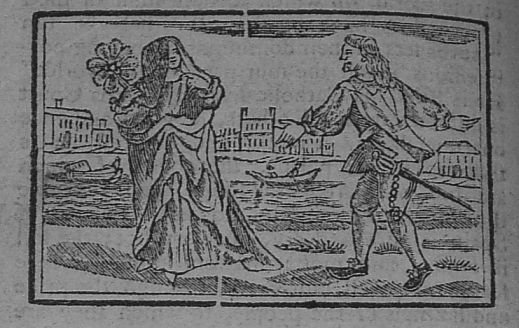
A Portuguese Man and Woman in their proper Habits.

An
Account of PORTUGAL.
PORTUGAL joins to Spain, and to the East is bounded by Spanish provinces; the capital city is Lisbon, a place of great trade and riches, with an excellent harbour: The soil of this country is poor, and produces but little, except wine and fruit. The nobility and gentry are magnificent and hospitable, but the common people much addicted to thieving. It is governed by its own King, who is by much the richest crowned head in Europe. His government is absolute, and crown hereditary. The established religion is Popery, though others are tolerated, but are under a necessity of being very reserved and cautious,
(109)
for fear of the inquisition, which is a court or tribunal for the examination and punishment of offenders, whom they torture in the most cruel manner [jewishvirtuallibrary.org states that the last auto-da-fe in Portugal took place on October 27, 1765. Not until 1808, during the brief reign of Joseph Bonaparte, was the Inquisition abolished in Spain].
Lisbon, the capital city, as before-mentioned, is about six miles in length, built on seven hills, surrounded with a wall, on which are 77 towers, and 36 gates; is reckoned to contain 30,000 houses, and 150,000 inhabitants, (whose foreign trade is equal to any city in Europe, except London and Amsterdam.)-- There is a cathedral, 37 parish churches, 23 cloisters, several handsome squares, and sumptuous buildings, the largest of which is the King's palace. Such was the state of this opulent city till the 1st of November, 1755, when the greatest part of it was reduced to a heap of ruins by a most tremendous earthquake, which was followed by a terrible fire. A gentleman who was present, giving an account of the calamity to his friend in England, says, "It is not to be expressed by human tongue, how dreadful and awful it was to enter the city after the disaster; in looking upwards one was struck with terror, in beholding frightful ruined fronts of houses, some leaning one way, some another; then, on the contrary, one was struck with horror in beholding dead bodies, by six or seven in a heap, crushed to death, half buried, half burnt; and if one went through the broad squares, nothing to be met with but people bewailing their misfortunes, wringing their
(110)
"hands, and crying the world was at an end: In short, 'twas the most lamentable scene that eyes could behold."
The King, in his letter on the melancholy occasion to the King of Spain, concludes thus: "I am without a house, in a tent, without servants, without subjects, without money, and without bread."
An
Italian Man and Woman in their proper Habits.
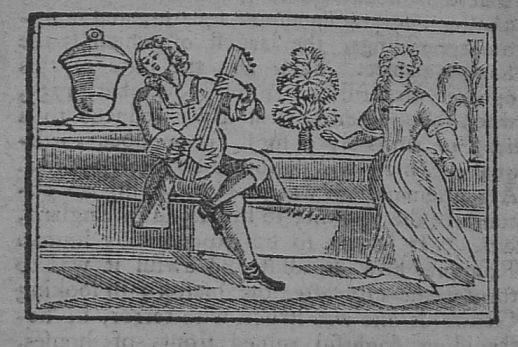
An Historical Description of ITALY.

An Historical Description of ITALY.
ITALY in the scriptures is called
Chittim [encyclopedia.com says
Kittim was Cyprus], and Mesech [said to be sixth son of Japheth; not
known what group they were]. Pliny (an ancient Latin
writer) gives it this character: "Italy is the nurse-mother of all
nations, elected by the Gods to make the Heavens more glorious,
"and unite the dispersed governments of the world." &c. The situation is very advantageous, being towards the midst of the Temperate Zone. It is bounded by the Alps on the North, which separates it from Germany; on the East by the Adriatic Sea; on the South by Mare Inferum, or the Sea of Tuscany; and on the West by a part of the Alps, and the River Var, which are its bounds towards France and Savoy. The air of this country is temperate and healthful; the soil so fruitful, that there seems to be a continual spring: It abounds with grain, fruits, and flowers, and a variety of living creatures, as well for pleasure as profit; on which account Italy is called the Garden of Europe. The people are polite, dexterous [sic], prudent, and ingenious, extremely revengeful, jealous, and great formalists; their genius lies much for poetry, music, antiquities, &c. and, in short, all the liberal arts. Their tongue is derived from the ancient Latin. The cities are fair, well built, and magnificent; Rome is looked on as the capital, and is called the Holy, Naples the Noble, Florence the Fair, Genoa the Proud, Milan the Great, Venice the Rich, Padua the Learned, and Bonia the Fat. There are 300 bishoprics in it, and many universities. It was governed of old by Kings, then by Consuls, and last of all by Emperors, who raised it to the highest pitch of glory. Only the Roman Catholic religion is professed in Italy; neither are the Protestants suffered there, though the Jews are permitted
in some cities. This country affords more entertainment to travellers than any other in the world, in which may be seen many remains of the greatest, wisest, and bravest people that ever lived, namely, the old Romans [it's a pity we can't ask the Etruscans how they felt...]. The present people are inured to slavery, harassed with tyrannies and impositions of their priests. The country is but badly cultivated; its commodities are wine, oil, corn, rice, velvets, silk, glass, &c.
(111)
"and unite the dispersed governments of the world." &c. The situation is very advantageous, being towards the midst of the Temperate Zone. It is bounded by the Alps on the North, which separates it from Germany; on the East by the Adriatic Sea; on the South by Mare Inferum, or the Sea of Tuscany; and on the West by a part of the Alps, and the River Var, which are its bounds towards France and Savoy. The air of this country is temperate and healthful; the soil so fruitful, that there seems to be a continual spring: It abounds with grain, fruits, and flowers, and a variety of living creatures, as well for pleasure as profit; on which account Italy is called the Garden of Europe. The people are polite, dexterous [sic], prudent, and ingenious, extremely revengeful, jealous, and great formalists; their genius lies much for poetry, music, antiquities, &c. and, in short, all the liberal arts. Their tongue is derived from the ancient Latin. The cities are fair, well built, and magnificent; Rome is looked on as the capital, and is called the Holy, Naples the Noble, Florence the Fair, Genoa the Proud, Milan the Great, Venice the Rich, Padua the Learned, and Bonia the Fat. There are 300 bishoprics in it, and many universities. It was governed of old by Kings, then by Consuls, and last of all by Emperors, who raised it to the highest pitch of glory. Only the Roman Catholic religion is professed in Italy; neither are the Protestants suffered there, though the Jews are permitted
(112)
in some cities. This country affords more entertainment to travellers than any other in the world, in which may be seen many remains of the greatest, wisest, and bravest people that ever lived, namely, the old Romans [it's a pity we can't ask the Etruscans how they felt...]. The present people are inured to slavery, harassed with tyrannies and impositions of their priests. The country is but badly cultivated; its commodities are wine, oil, corn, rice, velvets, silk, glass, &c.
A
Turkish Man and Woman in their proper Habits.
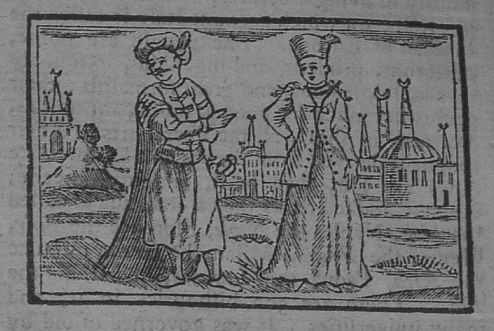
An Account of TURKEY.

An Account of TURKEY.
TURKEY,
or the Empire of the Turks, comprehends many provinces in Europe, Asia,
and Africa; so it is with reason the
Sultan is called Grand Signior. The empire is divided into 25 governments, of which there are seven in Europe, seventeen in Asia, and Egypt makes one of itself; two of the governments have what they call Beglerbergs [Beylerbey; from Turkish Beylerbeyi, "Bey of beys"] at the head of them, and the rest are governed by Bashaws [Pashas; from Persian padshah or padeshah , "king"]. Most of these countries are fruitful, but neglected through the laziness of the Turks, and oppressions the Christians lie under, who chuse [sic] rather to let the land lie untilled, than cultivate it for others. It is thin of inhabitants, occasioned by frequent plagues and continual wars, which carry off great numbers. They are very temperate, robust, and good soldiers. Their religion, whereof Mahomet was the author, comprehends six general precepts, viz. circumcision, prayer, fasting, alms, pilgrimage, and abstinence from wine. Friday is their most solemn day of the week, which they distinguish only by being longer at prayer on that than other days. They observe an extraordinary fast on the ninth month, which whoever breaks is certainly punished with death: They keep it so strict, that labourers ready to faint with thirst dare not taste a drop of water. They have a sort of monks called Dervises [sic], who live a very austere life, keeping a profound silence, go barefoot, with a leather girdle round their bodies, full of sharp points to mortify the flesh, and sometimes beat and burn themselves with hot irons: they are very charitable, and spare nothing for the maintenance of the poor. The
government is monarchial; the Grand Signior, or Sultan, is absolute master of the lives and fortunes of his subjects; his orders are above the laws, which are but few. If his ministers grow rich, they certainly suffer death, right or wrong, their wealth (which goes to the Sultan) being esteemed a clear proof of their guilt.
The customs and ways of the Turks are very different from ours: the left is the upper hand with them; they bury in the dark, and carry the dead head-foremost; their books are all manuscripts, for they suffer no printing among them. Their commodities are chiefly raw silks, oil, leather, cake-soap, honey, wax, and various fruits and drugs. Constantinople, which was formerly Thrace, by the Turks called Stamboul, is their capital, and seat of the Ottoman or Turkish Emperor.
(113)
Sultan is called Grand Signior. The empire is divided into 25 governments, of which there are seven in Europe, seventeen in Asia, and Egypt makes one of itself; two of the governments have what they call Beglerbergs [Beylerbey; from Turkish Beylerbeyi, "Bey of beys"] at the head of them, and the rest are governed by Bashaws [Pashas; from Persian padshah or padeshah , "king"]. Most of these countries are fruitful, but neglected through the laziness of the Turks, and oppressions the Christians lie under, who chuse [sic] rather to let the land lie untilled, than cultivate it for others. It is thin of inhabitants, occasioned by frequent plagues and continual wars, which carry off great numbers. They are very temperate, robust, and good soldiers. Their religion, whereof Mahomet was the author, comprehends six general precepts, viz. circumcision, prayer, fasting, alms, pilgrimage, and abstinence from wine. Friday is their most solemn day of the week, which they distinguish only by being longer at prayer on that than other days. They observe an extraordinary fast on the ninth month, which whoever breaks is certainly punished with death: They keep it so strict, that labourers ready to faint with thirst dare not taste a drop of water. They have a sort of monks called Dervises [sic], who live a very austere life, keeping a profound silence, go barefoot, with a leather girdle round their bodies, full of sharp points to mortify the flesh, and sometimes beat and burn themselves with hot irons: they are very charitable, and spare nothing for the maintenance of the poor. The
(114)
government is monarchial; the Grand Signior, or Sultan, is absolute master of the lives and fortunes of his subjects; his orders are above the laws, which are but few. If his ministers grow rich, they certainly suffer death, right or wrong, their wealth (which goes to the Sultan) being esteemed a clear proof of their guilt.
The customs and ways of the Turks are very different from ours: the left is the upper hand with them; they bury in the dark, and carry the dead head-foremost; their books are all manuscripts, for they suffer no printing among them. Their commodities are chiefly raw silks, oil, leather, cake-soap, honey, wax, and various fruits and drugs. Constantinople, which was formerly Thrace, by the Turks called Stamboul, is their capital, and seat of the Ottoman or Turkish Emperor.
 Solar System |
